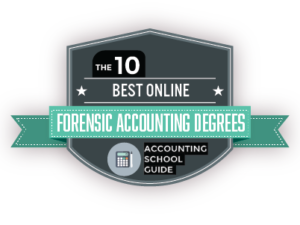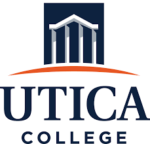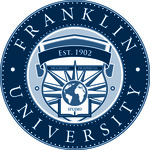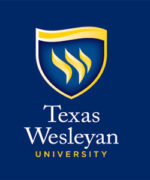
Accounting remains one of the most popular and in-demand careers, with the U.S. Bureau of Labor Statistics projecting 140,000 new accounting and auditing jobs over the next decade (about a 10% employment increase). Generally speaking, the accounting job market is tied to the economy at large — more business means more accounting — but even economic downturns tend to support accounting jobs more than other professions — bad business needs accounting, too.
The increase in digital transactions, as well as increasingly complex financial deals, have also kept accountants employed. For instance, job titles like Financial Examiner and Forensic Analyst are also on the rise. Public and private organizations need people to monitor and manage their books more than ever before, and colleges and universities have noticed, offering in-depth accounting programs with concentration and specialization tracks that cover a range of fields.
To help you decide the best program for your needs, we’ve ranked the 10 best online bachelor’s in forensic accounting, with a focus on flexibility, affordability, and academic quality. While every program follows a similar core curriculum, each offers unique perspectives and emphases. Not all of the below features built-in fraud or forensic tracks, but each offers relevant courses in the area and builds a foundation for future learning and skill development. Keep reading to find the degree that’s right for you!
1) Utica College

Founded in 1946, Utica College is a private institution in the state of New York with a total enrollment of about 5,100. US News ranks it among the best schools in the region. In addition to a rigorous academic curriculum, Utica emphasizes experiential learning through a variety of internship, clinical placements, and workplace opportunities. The 12:1 student-to-faculty ratio encourages an intimate, collaborative atmosphere, and over 60% of classes have fewer than 20 students. For those interested, 82% of full-time undergrads receive some form of financial aid. Other benefits include credit for life experiences, academic and career counseling services, and support for active duty and military veterans.
Utica offers an online BS in Fraud and Financial Crime Investigation that teaches students how to detect, prevent, analyze, and investigate the many types of economic crime. Major courses credits (25-28 credit hours) include Economic Crime Theory, Intro to Criminal Justice, Cybercrime Law and Investigations, Information Privacy, an internship or senior project, and related coursework in statistics, financial accounting, and criminal law. From there, students can customize the bachelor’s through a concentration in either Financial Investigation or Fraud Prevention and Detection. All courses are designed for maximum flexibility to fits students’ unique schedules, and the average degree completion time is a little over 3 years. Utica is the first college in the country to partner with the Association of Certified Anti-Money Laundering Specialists (ACAMS).
- Homepage
- Tuition: $20,676
2) Franklin University

Founded in 1902, Franklin University is a private institution designed for adult learners, working professionals, and non-traditional students, with a growing emphasis on online education services. The average student is in their mid-30s, and 90% of students transfer into a program using prior academic credits. All programs feature maximum flexibility to accommodate students’ schedules, and multiple accelerated models are available, as well. The 13:1 student-to-faculty fosters a tight-knit learning community, and individualized instruction by Franklin’s expert faculty. Student support services include career development, academic advising, tech support, online tutoring, enrollment assistance, and more. About 40% of full-time undergrads receive some form of financial aid.
Franklin offers an online BS in Forensic Accounting that consists of 36 major credit hours in Intermediat Accounting, Fraud Examination, nterviewing Techniques for Fraud Invest, Legal Elements of Fraud, Accounting Information Systems, Auditing, and a captone experience among other subjects. From there, students have the opportunity to tailor the degree for professional interests through electices, and build a foundation to seek CFE, CPA and CIA certification. In addition to a rigorous, industry-aligned curriculum, Franklin’s program emphasizes real-worl, hands-on learning, and faculty are experienced professionals in the field. To accommodate adult learners, all coursework is built for maximum flexibility, and Franklin offers a generous transfer policy. The bachelor’s is accredited by the IACBE.
- Homepage
- Tuition: $11,881
3) University of Alabama Birmingham

Founded in 1969, University of Alabama Birmingham has a student enrollment of about 19,600, representing more than 100 countries across the world. UAB ranks 20th in the country (1st in Alabama) for federal research and development funding, and Princeton Review, Bloomberg Businessweek, Forbes, and US News all highlight UAB’s academic programs. With a 16:1 student-to-faculty ratio, UAB combines the resources of a large university with the small, intimate atmosphere of a smaller liberal arts school. Over a third of classes have fewer than 20 students, and less than one in five have 50.
UAB offers an online BS in Accounting that prepares students to sit for CPA, CISA, CIA, CFE, and CMA exams. Core requirements include Financial Accounting, Accounting Information Systems, Cost Accounting, Income Taxation, Internal Auditing, and International Accounting, among others. Students then complete a variety of upper-level management courses, followed by 6 credit hours of in capstone experience. While there is no specialization in fraud, students may be able to customize the degree, and the subject is covered in the major curriculum. In addition to flexible scheduling, UAB offers transfer options for students with previous bachelor credits, and a 24/7 tech support service guarantees online students can study whenever and wherever. The degree is accredited by AACSB and the SACS, and endorsed by the Institute of Management Accountants.
- Homepage
- Tuition: $23,790
4) Troy University

Troy University is a comprehensive public institution in Alabama with a total enrollment of 20,000. Recognized by Forbes, Washington Monthly, the Princeton Review, and US News as one of the best schools in the region, it’s also been ranked the 25th best school in the country for international students by the Institute of International Education. Graduates benefit from an alumni network of more than 100,000, from all 50 states and countries around the world. The 15:1 student-to-faculty ratio promotes tailored, individualized instruction, and over half of classes have fewer than 20 students. Nearly 70% of full-time undergrads receive some form of financial aid.
Troy offers an online bachelor’s in Accounting with concentrations in both Public and Management Accounting. CommonI courses include International Accounting, Auditing, Accounting Information Systems, Financial Reporting & Analysis, Advanced Applications for Business and Accounting, and Forensic Accounting. Public Accounting students complete coursework in areas like Governmental Accounting and Managerial/Cost Accounting; Management Accounting students complete Internal Auditing, Introduction to Taxation, and either Financial Statement Analysis or Investments. In addition to online delivery, Troy offers hybrid options to give students flexibility. Depending on the concentration, graduates are prepared to take the CPA or CMA.
- Homepage
- Tuition: $22,267
5) Point University

Point University, founded in 1964, is a private Christian institution in West Point, Georgia (as well as additional campuses in Atlanta, Savannah, McDonough and Peachtree City, and Birmingham), with a total enrollment of about 2,000 students from 43 states, three US territories, and more than 15 foreign countries. US News ranks Point among the top 50 colleges in the region. With an 18:1 student-to-faculty ratio, the university maintains a vibrant, collaborative atmosphere alongside small class sizes (73% less than 20 students). Half of full-time undergrads receive financial aid, and academic and career counseling services are available.
Point offers an online BS in Accounting that prepares students to examine a variety of financial transactions, including mergers and acquisitions, bankruptcies, and contract disputes. Core requirements feature a fraud and forensics emphasis, including courses in Accounting Information Systems, Income Tax Accounting, Fraud Examination and Fraud Schemes, Forensic & Investigative Accounting, and Detection & Prevention of Fraudulent Financial Statements. From there, students can tailor the degree through a variety of electives, many of which are management-focused for those who want to pursure an MBA program. All coursework is highly flexible and 100% asynchronous, and Point’s generous transfer programs allows up to 80 credits. If a full bachelor’s track doesn’t fit your current needss, an associate’s in Accounting is also available via online delivery.
- Homepage
- Tuition: $20,600
6) University of Minnesota Twin Cities

Founded in 1919, Minnesota’s Carslon School of Management offers undergraduate, graduate, and doctoral degrees, an executive education program, and dual degrees. Bloomberg Businessweek, Forbes, Financial Times, and US News ranks it among the best schools in the region. US News also lists on rankings for veteran support and value. The 17:1 student-to-faculty fosters an intimate, tight-knit learning community, and a third of all classes have fewer than 20 students. Half of full-time undergrads receive financial aid, and academic and career counseling services are available.
Minnesota’s online BS in Accounting combines theoretical as well as analytical frameworks to prepare students for careers in public, private, or governmental accounting. With 63 major credit requirements, students complete coursework in areas like Accounting Systems, Auditing, Income Tax, Managerial Finance, and Business Ethics, among others. Electives are available to customize the curriculum plan, so students are encouraged to talk with their advisors about relevant areas of professional interest. Previous graduates have gone on to become financial accountants, forensic accountants and auditors, cost and management accountants, management advisory consultants, and independent auditors. Depending on coursework, graduates can sit for Certified Public Accountant (CPA), Certified Management Accountant (CMA) or Certified Internal Auditor (CIA) examinations.
- Homepage
- Tuition: $26,603
7) Point Park University

Founded in 1960, Point Park University is a private liberal arts school in Pittsburgh with a total enrollment of about 4,100, including students from 40 states and 42 countries. US News ranks Point Park among the best universities in the region, higlighting top-rated online bachelor’s and graduate programs. (Over 90% of students are enrolled online.) The 13:1 student-to-faculty ratio supports a highly collaborative, intimate educational setting, and three-quarters of classes have fewer than 20 students. Further, for students interested in financial aid, Park Point has a near-perfect track record: 92% of full-time undergrads receive some form of aid, and the average need met is 70%.
Point Park offers an online BS in Accounting covering macroeconomics, business law, and computer accounting programs and skills. Major courses include Tax Accounting, Auditing, Bus Communications and Research, Corporate Finance, Strategic Planning, and more. To customize the degree, several built-in electives are offered, including studies in forensics and fraud examination. In addition to in-class learning, Point Park emphasizes hands-on experience through internship opportunities at high-profile organizations: PwC (PricewaterhouseCoopers), Deloitte, EY (Ernst & Young), and the Federal Bureau of Investigation (FBI) have all hosted PPU interns. The BS is 100% online, and accelerated 8-week delivery blocks allow students with previous academic credits to complete the degree in as little as two years. For those interested, the bachelor’s also includes 6 credits that students can apply to the school’s MBA program.
- Homepage
- Tuition: $30,130
8) Southern New Hampshire University

Founded in 1932, Southern New Hampshire University is a worldwide leader in online education, with 70,000 online students and 200 online programs. US News ranks SNHU 1st in the nation for innovation, and Fast Company, The Chronicle of Higher Education, and New Hampshire Business Review have all recognized the university for its innovative education model. With a 15:1 student-to-faculty ratio, SNHU offers students intimate instruction in a dynamic and collaborative setting: over sixty percent of classes contain less than 20 students. Other benefits include credit for life experiences, academic and career counseling services, and support for service members.
Southern New Hampshire’s online BS in Accounting with concentration in Forensice Accounting and Fraud Examination. Potential coursework includes in Cost Acccounting, Federal Taxation, Financial Statement Analysis, Business Law, Auditing and Forensic Accounting, Detection and Prevention of Fraudulent Financial Statements, and Legal Aspects of Fraud, among others. Accelerated 8-week course blocks allow students to complete the degree in as little time as possible, which is especially helpful when factoring in SNHU’s generous transfer policy (up to 90 credits). Graduates of the program will be prepared to apply accounting principles in complex financial transactions, exercise analytical skills, and effectively communicate accounting concepts and information in the worlkplace. The degree is accredited by the NEASC and ACBSP.
- Homepage
- Tuition: $31,136
9) Old Dominion University

Old Dominion University, founded in 1930, is a Tier 1 public university in Norfolk, Virginia, with an enrollment of 25,000. The university’s distance education program launched in 1994. Today it offers 60 unique programs that can be completed 100% online or in hybrid formats at one of Old Dominion’s 50 partner locations in Virginia, Arizona, and Washington. The 19:1 student-to-faculty ratio supports the best of both worlds – small, intimate classrooms alongside collaborative learning opportunities – and over 35% of classes have less than 20 students and just 10% have 50. There are over 124,000 alumni in all 50 states and 67 countries. Other benefits incldue credit for life experiences, academic and career counseling services, and support for service members.
Old Dominion’s online Accounting BSBA teaches students technical accounting knowledge, communication and computer skills, and effective analytical techniques, in addition to fundamental business concepts. Core courses include Contemporary Organizations/Management, Business Policy & Strategy, Operations Management, Microeconomics, Legal Environments of Business, and Principles of Finance. Accounting concentration courses include Managerial Accounting, Taxation, Accounting Information Systems, and at least four electives, allowing students to customize the degree according to professional interests. (Students interested in pursuing an MBA or MPA have the opportunity to earn graduate credits for early entry programs.) The degree is accredited by the Association to Advance Collegiate Schools of Business – International.
- Homepage
- Tuition: $28,200
10) Texas Wesleyan University

Founded in 1890, Texas Wesleyan University is a private institution with a total enrollment of about 2,600. US News ranks it among the best schools in the region and a top-30 school for veteran support and overall value. With a 17:1 student-to-faculty ratio, Texas Wesleyan offers intimate, highly collaborative instruction, and 60% of have classes have fewer than 20 students. For those interested, three-quarters of full-time undergrads receive some form of financial aid, and the average need met is 66%. Additional benefits include credit for life experiences, academic and career counseling, and more.
Texas Wesleyan’s online BS include coursework in Financial Accounting, Advanced Business Applications, Managerial Accounting, Business Communications, Forensic Fraud IT Audit, Business Law, International Business, and Business Policy & Decision Making, among others. Open electives encourage students to tailor the degree to areas of professional interest, and hands-on opportunities like a Forensic Fraud practicum promote real-world learning experience. Graduates have gone on to work at private firms (Rylander, Clay and Opitz, Whitley Penn, and PwC), public agencies, and corporations like BNSF, XTO Energy, GM Financial, and L Hoist North America.
- Homepage
- Tuition: $27,392
